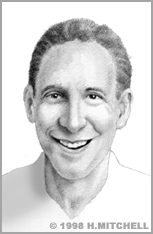Robert Langer
Years after receiving a Gilbert Chemistry Set as a young boy, Robert S. Langer is still committed to learning and discovering in chemistry. A member of the National Academy of Sciences, the National Academy of Engineering, the National Academy of Medicine, and the National Academy of Inventors, Langer holds over 1,300 patents, alone or with others, in the fields of biomedical and chemical engineering, biomaterials, and controlled drug delivery.
Langer was born on August 29, 1948 in Albany, New York. A bright student, his family members and high school guidance counselor suggested he pursue a career in engineering. Langer was accepted into Cornell University, where he wasn’t entirely interested in his major, but enjoyed working with students, helping explain difficult concepts as a teaching assistant. His positive experience in this role sparked an interest in teaching.
Langer earned a BS (with distinction) in Chemical Engineering from Cornell University in 1970 and a ScD in Chemical Engineering from the Massachusetts Institute of Technology (MIT) in 1974. Since then, he has continued to conduct research at the Children's Hospital Medical Center in Boston through the Harvard Medical School and at the Massachusetts Institute of Technology, where he has been teaching and doing research since 1977. In the mid-1970s, Langer began his research into polymers, which form the bulk of his discoveries. On the strength of these discoveries, Langer earned the 1998 Lemelson-MIT Prize, after an intensive year long process by the awards program and a jury, independent of MIT, of leading experts from a range of scientific engineering and medical disciples in academia and industry.
As a biomedical engineer whose major focus is biomaterials, Langer specializes in controlled drug delivery and tissue engineering. His discoveries are at the heart of today's multibillion-dollar controlled drug delivery industry, which prolongs life and eases the suffering of millions every year. His innovations have provided a framework for the emerging technology of tissue engineering and have been used in such areas as drug delivery systems, vaccines, tissue repair, diagnostics, innovative waste disposal technologies, and novel therapeutics.
Langer has been an outstanding force in the development of new systems for controlled delivery of pharmaceuticals. Langer's groundbreaking research in polymers dispelled the belief that only some sizes of molecules could be slowly delivered. His discoveries led to the first approaches to the slow release of ionic drugs, peptides, and other large molecules such as proteins and DNA.
His later research led to a number of novel biodegradable polymers that could be used in medicine. One of these resulted in a drug-delivery system for the treatment of brain cancer (developed with Dr. Henry Brem of Johns Hopkins University Medical School). Approved in 1996, it was the first FDA-approved treatment for brain cancer in 20 years and the first polymer-based treatment to deliver chemotherapy directly to the tumor site. This treatment has extended the lives of numerous patients and has greatly reduced the side effects of conventional chemotherapy. A recent study on brain tumor implants based on Langer's drug delivery systems indicate that more than five times as many people are still alive at the end of two years than with other ways of treating brain tumors. Thousands of people have benefited from these treatments.
Langer's numerous breakthroughs have earned him over 220 national and international awards and honors, including the United States National Medal of Science, the United States National Medal of Technology and Innovation, and the Charles Stark Draper Prize. He is a member of numerous professional organizations, including the Controlled Release Society, the Biomedical Engineering Society, the American Institute of Chemical Engineers, the American Chemical Society, and the Science Board of the U.S. Food and Drug Administration, the highest Advisory Board of the FDA.
Langer remains involved with the Department of Chemical Engineering and is the David H. Koch Institute Professor at MIT. Institute Professor is the highest honor that can be awarded to a faculty member. He has co-founded over 35 companies, but the perhaps the well-known is the American pharmaceutical company, Moderna, which produced a U.S. approved vaccine for COVID-19 in December 2020.
Langer shows no signs of slowing down in his focus on maximizing positive impacts on society through his research.
You can learn more about Langer in this case study.


